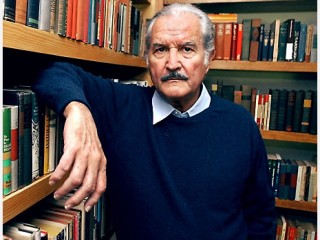
Carlos Fuentes biography
Date of birth : 1928-11-11
Date of death : -
Birthplace : Mexico City, Mexico
Nationality : Mexican
Category : Famous Figures
Last modified : 2011-02-11
Credited as : Short-story writer, novelist and essayist, political writer
Carlos Fuentes was a Mexican short-story writer, novelist, essayist, and political writer whose works are a mixture of social protest, realism, psychological insight, and fantasy.
Carlos Fuentes was born on Nov. 11, 1928, in Mexico City. As the son of a Mexican diplomat, he went to school in Washington, D.C., where he became proficient in the English language. He held a law degree from the National University of Mexico and also studied at the Institute of Advanced International Studies in Geneva. He served in the Mexican diplomatic service and traveled in Cuba, Europe, the Soviet Union, the United States, and Latin America.
His first book, Los daas enmascarados (1954; The Masked Days), consisted of a series of six stories in which the real world is mingled with the disquieting world of fantasy. He formed and directed, with Emmanuel Carballo, the Revista mexicana de literatura (1955-1958; Mexican Review of Literature). During 1956-1957 he held a scholarship at the Mexican Center for Writers.
Fuentes's first great novel, La region mas transparente (1958; Where the Air Is Clear), caused a real sensation in literary circles and definitely established him as one of the best young writers. It portrays many grave social problems in contemporary Mexico City in a tone of bitter and violent protest. The structure is developed by continuous juxtaposition of scenes from different social levels and from different epochs. Fuentes uses interior monologue and portrayal of the subconscious mixed with pages that resemble an essay more than a novel. His second novel, Las buenas conciencias (The Good Conscience), appeared in 1959. It undertakes a clarification of Mexican life in greater depth and broader perspective. It is a moral drama of Mexican society in which everyone appears both as victim and accomplice.
During 1959-1960 Fuentes edited El espectador (The Spectator). Aura (Dawn), a short novel, appeared in 1962, and that same year he saw the publication of La muerte de Artemio Cruz (The Death of Artemio Cruz). In this work Fuentes covers half a century of Mexican life, portraying the class which predominated in Mexico at the time, as represented by a man who took part in some of the skirmishes of the Revolution and, beginning in 1920, started to make a large fortune and acquire immense power. The death of this man and his 12 hours of agony constitute the theme of this novel. It was translated into numerous languages.
Fuentes's second volume of short stories, Cantar de ciegos (1964; Song of the Blind), is a synthesis of his literary worlds: magic, realistic, and humorous. In 1967 he won the Premio Biblioteca Breve, offered by the Seix Barral publishing company, for his novel Cambio de piel (Change of Skin).
Fuentes continued to write short stories, novels, plays, and essays which usually address political or social concerns of Mexico and central America. He was also an historian, of sorts, incorporating important figures of Mexican history into his fiction. Fuentes did this because it revealed Mexico—both past and present—to the world. He explained this view to George Kourous in Montage, "Mexico … made me understand that only in an act of the present can we make present the past as well as the future: to be a Mexican was to identify a hunger for being, a desire for dignity rooted in many forgotten centuries and in many centuries yet to come, but rooted, here, now, in the instant, in the vigilant time of Mexico."
Fuentes critical success reached new heights in 1975 with the release of Terra nostra. This novel about the evolution of Mexico earned Fuentes the Mexican Alfonso Reyes Prize. Fuentes's next fictions explored the spy novel and Mexico's place in the world. In 1985 Fuentes published El Gringo Viejo, a novel in which he combined an historical figure (American journalist Ambrose Bierce) with the supernatural, and Fuentes received some of the best reviews in his extensive literary career. Jane Fonda and Gregory Peck starred in a movie adaption of this novel.
Readers and critics both admired and despised Fuentes. Many critics cited his political views as a distraction to his literary talents; others wished he would focus only on writing fiction instead of exploring political commentary. Octavia Paz, one of Mexico's most recognized poets, was often an outspoken critic of Fuentes. However, his detractors did not prevent him from continually winning literary awards, including the Premio Cervantes in 1988.
In an interview in Booklist in 1996, Fuentes lamented the fact that in Mexico, "literature remains a minority affair." He was disappointed that culturally, the value of literature as its own entity does not exist. In 1997 in World Press Review, Fuentes claimed that Mexico had become the scapegoat for all of the problems in the United States. Throughout his career, Fuentes wrote his views and his opinions, not caring who he pleased or who he offended. Through all of this, the only consistent classification he has earned is the reputation as a master narrator. Fuentes himself challenged his critics, "Don't classify me, read me. I'm a writer, not a genre. Do not look for the purity of the novel according to some nostalgic canon." According to Fuentes, the canon, the collected body of prized literary works, needed to include more multicultural authors and texts. Because of his contributions to journalism, fiction, and non-fiction, Fuentes became an influential Hispanic writer who has expanded the literary canon.
Chalene Helmuth, The Postmodern Fuentes, Bucknell University Press, 1997, provides a contemporary analysis of Fuentes's work. Raymond L. Williams, The Writings of Carlos Fuentes: History, Culture, and Identity, Unviersity of Texas Press, 1996, provides a more complete overview of the writer. Fuentes was interviewed in Publisher's Weekly, October 25, 1991; Montage, September 1994; and Booklist, September 15, 1996.
















